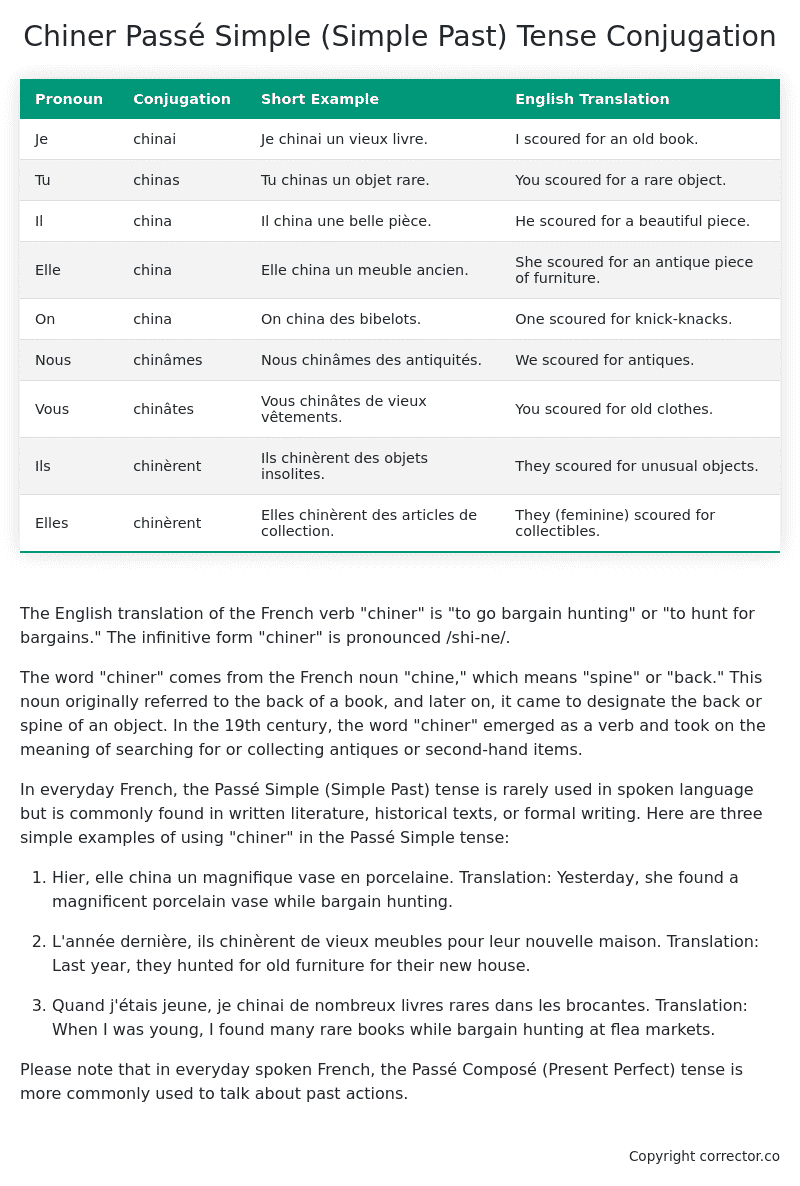Passé Simple (Simple Past) Tense Conjugation of the French Verb chiner
Introduction to the verb chiner
The English translation of the French verb “chiner” is “to go bargain hunting” or “to hunt for bargains.” The infinitive form “chiner” is pronounced /shi-ne/.
The word “chiner” comes from the French noun “chine,” which means “spine” or “back.” This noun originally referred to the back of a book, and later on, it came to designate the back or spine of an object. In the 19th century, the word “chiner” emerged as a verb and took on the meaning of searching for or collecting antiques or second-hand items.
In everyday French, the Passé Simple (Simple Past) tense is rarely used in spoken language but is commonly found in written literature, historical texts, or formal writing. Here are three simple examples of using “chiner” in the Passé Simple tense:
-
Hier, elle china un magnifique vase en porcelaine.
Translation: Yesterday, she found a magnificent porcelain vase while bargain hunting. -
L’année dernière, ils chinèrent de vieux meubles pour leur nouvelle maison.
Translation: Last year, they hunted for old furniture for their new house. -
Quand j’étais jeune, je chinai de nombreux livres rares dans les brocantes.
Translation: When I was young, I found many rare books while bargain hunting at flea markets.
Please note that in everyday spoken French, the Passé Composé (Present Perfect) tense is more commonly used to talk about past actions.
Table of the Passé Simple (Simple Past) Tense Conjugation of chiner
| Pronoun | Conjugation | Short Example | English Translation |
|---|---|---|---|
| Je | chinai | Je chinai un vieux livre. | I scoured for an old book. |
| Tu | chinas | Tu chinas un objet rare. | You scoured for a rare object. |
| Il | china | Il china une belle pièce. | He scoured for a beautiful piece. |
| Elle | china | Elle china un meuble ancien. | She scoured for an antique piece of furniture. |
| On | china | On china des bibelots. | One scoured for knick-knacks. |
| Nous | chinâmes | Nous chinâmes des antiquités. | We scoured for antiques. |
| Vous | chinâtes | Vous chinâtes de vieux vêtements. | You scoured for old clothes. |
| Ils | chinèrent | Ils chinèrent des objets insolites. | They scoured for unusual objects. |
| Elles | chinèrent | Elles chinèrent des articles de collection. | They (feminine) scoured for collectibles. |
Other Conjugations for Chiner.
Le Present (Present Tense) Conjugation of the French Verb chiner
Imparfait (Imperfect) Tense Conjugation of the French Verb chiner
Passé Simple (Simple Past) Tense Conjugation of the French Verb chiner (You’re reading it right now!)
Passé Composé (Present Perfect) Tense Conjugation of the French Verb chiner
Futur Simple (Simple Future) Tense Conjugation of the French Verb chiner
Futur Proche (Near Future) Tense Conjugation of the French Verb chiner
Plus-que-parfait (Pluperfect) Tense Conjugation of the French Verb chiner
Passé Antérieur (Past Anterior) Tense Conjugation of the French Verb chiner
Futur Antérieur (Future Anterior) Tense Conjugation of the French Verb chiner
Subjonctif Présent (Subjunctive Present) Tense Conjugation of the French Verb chiner
Subjonctif Passé (Subjunctive Past) Tense Conjugation of the French Verb chiner
Subjonctif Imparfait (Subjunctive Imperfect) Tense Conjugation of the French Verb chiner
Subjonctif Plus-que-parfait (Subjunctive Pluperfect) Tense Conjugation of the French Verb chiner
Conditionnel Présent (Conditional Present) Tense Conjugation of the French Verb chiner
Conditionnel Passé (Conditional Past) Tense Conjugation of the French Verb chiner
Conditionnel Passé II (Conditional Past II) Tense Conjugation of the French Verb chiner
L’impératif Présent (Imperative Present) Tense Conjugation of the French Verb chiner
L’impératif Passé (Imperative Past) Tense Conjugation of the French Verb chiner
L’infinitif Présent (Infinitive Present) Tense Conjugation of the French Verb chiner
L’infinitif Passé (Infinitive Past) Tense Conjugation of the French Verb chiner
Le Participe Présent (Present Participle) Tense Conjugation of the French Verb chiner
Le Participe Passé (Past Participle) Tense Conjugation of the French Verb chiner
Struggling with French verbs or the language in general? Why not use our free French Grammar Checker – no registration required!
Get a FREE Download Study Sheet of this Conjugation 🔥
Simply right click the image below, click “save image” and get your free reference for the chiner Passé Simple tense conjugation!

Chiner – About the French Passé Simple (Simple Past) Tense
Formation
Usage
Narration
Historical Context
Interactions with other tenses
Passé Composé
Imparfait
Conditional and Subjunctive
Summary
I hope you enjoyed this article on the verb chiner. Still in a learning mood? Check out another TOTALLY random French verb conjugation!


